SOLID GOLD 1





Solid Gold 1s andra upplaga är reviderat helt i linje med Gy25, och ger eleven både stöd och utmaningar för att utveckla sin engelska. Med aktuella ämnen, engagerade texter och utmanande övningar bjuder Solid Gold in eleverna till diskussion, interaktion och kommunikation.
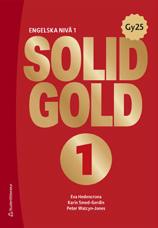
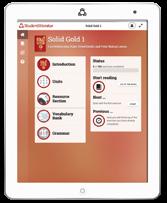
Med Solid Gold får eleverna en fascinerande inblick i levnadsförhållanden, sociala frågor och kulturella aspekter i den engelsktalande världen, och dessutom en omfattande Resource Section, och många övningar..
Texterna i den interaktiva elevboken är inläst med autentiskt tal och textföljning, och självrättande interaktiva uppgifter ger eleverna mer träning i grammatik och ordträning. Online Grammar 1 ingår i Solid Gold 1.
Interaktiv version av boken, med inlästa texter och ljudet till alla hörövningarna.
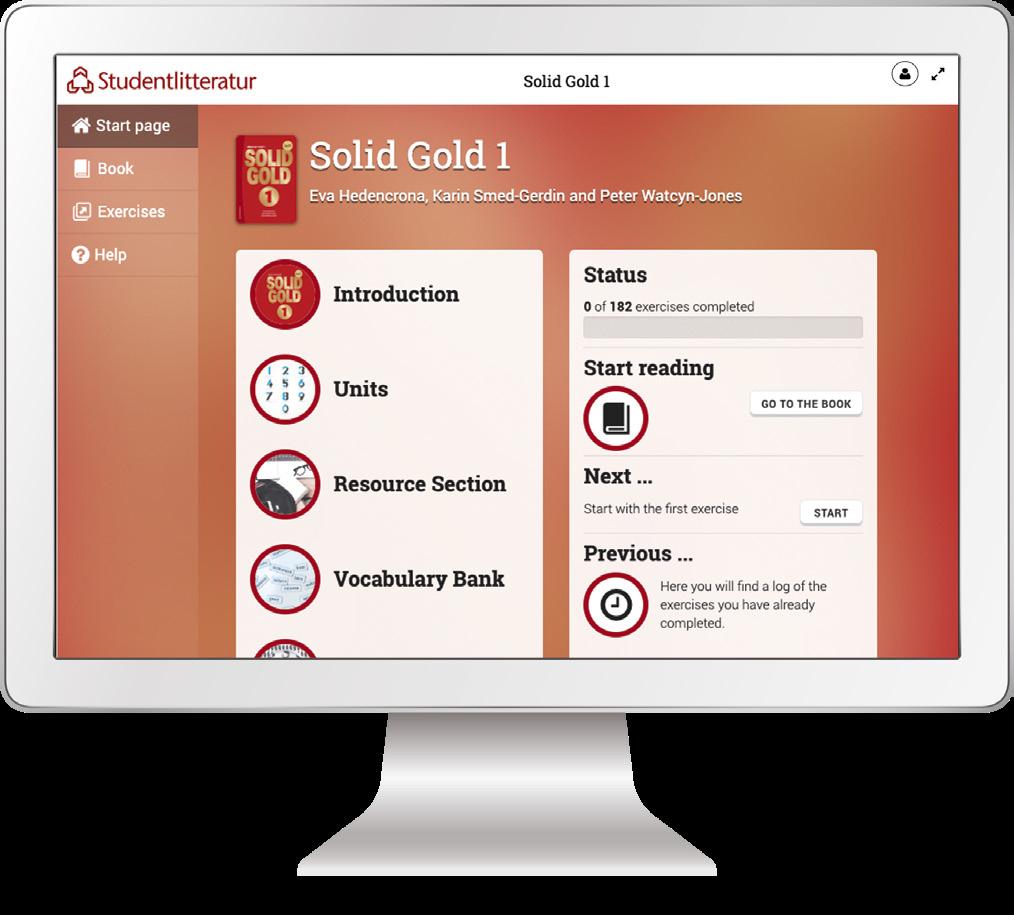
Interaktiva övningar
Fungerar på dator, surfplatta och delvis i mobiltelefon
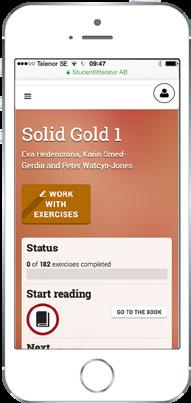
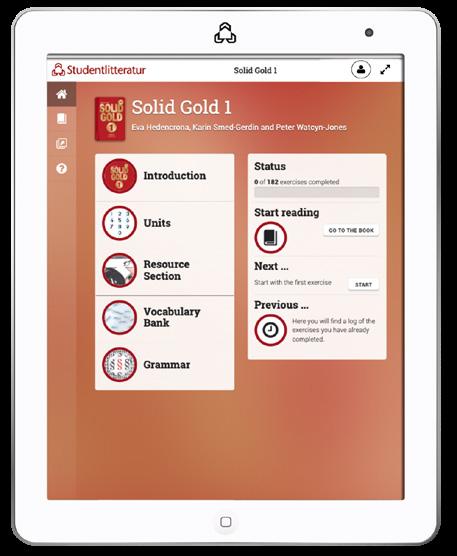
Studentlitteratur AB
Box 141
221 00 LUND
Besöksadress: Åkergränden 1
Telefon 046-31 20 00
studentlitteratur.se
Kopieringsförbud
Detta verk är skyddat av upphovsrättslagen. Kopiering, utöver lärares begränsade rätt att kopiera för undervisningsändamål enligt Bonus
Copyright Access skolkopieringsavtal, är förbjuden. För information om avtalet hänvisas till utbildningsanordnarens huvudman eller Bonus Copyright Access.
Vid utgivning av detta verk som e-bok, är e-boken kopierings skyddad.
Användning av detta verk för text- och datautvinningsändamål medges ej.
Den som bryter mot lagen om upphovsrätt kan åtalas av allmän åklagare och dömas till böter eller fängelse i upp till två år samt bli skyldig att erlägga ersättning till upphovsman eller rättsinnehavare.
Studentlitteraturs trycksaker är miljöanpassade, både när det gäller papper och tryckprocess.
Art.nr 36446
ISBN 978-91-44-15971-3
Upplaga 2:1
© Författarna och Studentlitteratur 2014, 2025
Redaktör: Charlotte Rosen Svensson
Formgivning: Helena Jansson Formgivning
Printed by Dimograf, Poland 2025
Solid Gold 1 will improve your English in a variety of ways. Firstly, it will help you build the skills you need for English at upper secondary school, and specifically for level 1 (Engelska nivå 1). You can access Solid Gold 1 fully on a computer or tablet, and partly on a smartphone, whichever suits you best. The Quick Guide to Solid Gold on pages 4–5 will show you what there is and how everything works.
Solid Gold 1 covers the core content of English, level 1. The focus in the nine units is mainly on living conditions, social issues and cultural features in the English-speaking world. Solid Gold 1 also aims to make you aware of how culture influences communication. There is a variety of texts from different genres such as fiction, non-fiction, extracts from biographies, newspaper articles, reviews, songs, etc. Some Names Worth Knowing updates you on some famous people in your fields of study.
In the Resource Section you will be introduced to different strategies to use when learning English. There is also advice on how to become a better speaker or writer. For example, you will learn how to adapt your language according to the purpose, recipient and situation. Your ability to narrate, instruct, summarise, explain, discuss and argue will all be practised in Solid Gold 1.
The Exercises deal with the language and subject matter of the texts. Many of the exercises can be done either in the printed book or digitally and there are additional digital exercises, including intensive vocabulary practice.
The Vocabulary Bank section will help you expand your vocabulary further. There is an extensive Grammar section in the book, and Online Grammar, with explanations and interactive exercises, is included with Solid Gold Want Some More? in the digital material provides additional reading with exercises.
We hope that Solid Gold 1 will help you move ahead in your English studies, improving your communication skills and broadening your knowledge and understanding of the world where English is used.
The Solid Gold Team
Solid Gold 1 provides a complete base for your English course, offering a wide range of printed and digital materials. You may not have time to use everything in Solid Gold 1 but we hope you will find all you need.
Reading
Nine units, each with a theme, containing a variety of texts from different countries. The authors of the texts are also presented and the illustrations are intended to provide extra food for thought.
In Some Names Worth
Knowing a number of well-known people from the 19th century to the present are described. This is linked to a section of exercises with thematic questions focusing on aspects of your school work: social science, humanities, natural science, technology and economics.
Resource Section
An invaluable handbook on how to improve your language skills. You can look up critical reading and reviewing of sources, letter writing, how to work with different genres and much more.
Exercises
In the exercise section of Solid Gold 1 there is an extensive body of exercises on each of the texts, as well as listening and grammar exercises.
WSM (Want Some More?)
Under this heading there is a selection of extra texts for further reading, some of them printed in the book and others appearing as extra texts in the digital material.
Vocabulary Bank
Here is an opportunity to learn useful words which do not necessarily occur in the nine chapters. The exercises are divided into three groups: Useful verbs, Useful adjectives and Useful nouns.
Focus on Grammar
Each unit has a section called Focus on Grammar, which suggests what grammar you should work with. The grammar rules are explained in the Grammar Section at the back of the textbook. References to these pages are given in each unit.
Word Lists
Word lists for all the texts and listening exercises.
Recorded texts and word lists
All the texts in Solid Gold 1 are recorded with native voices from different English-speaking countries. The word lists are also recorded.
Listening comprehension
The listening comprehension passages are recorded with native voices from different English-speaking countries.
Finding your way in the e-book
When a page number is available, you can often double-click on it to go directly to that page. You can also click on the digital link to follow that directly to the audio file, to different exercises, and to extra material available online.
Digital exercises
Follow the digital links to go directly to the audio files and the interactive exercises, including exercises on vocabulary, comprehension, and grammar.
Online Grammar 1
This is a digital resource with filmed grammar explanations, grammar rules, and interactive exercises. It can be found as a separate resource in your digital bookshelf (Bokhyllan).


The Right Level?
LISTENING: Losing My Virginity
LISTENING: Losing My Virginity
The Freedom Writers Diary
The Freedom Writers Diary
LISTENING: The Freedom Writers Diary cont’d questions and
LISTENING: The Freedom Writers Diary cont’d questions and
Before you read the text, look through the word list on page 331.
◉ BY ELIZABETH GILBERT
Elizabeth Gilbert was born in Connecticut, USA in 1969. She is best known for her 2006 memoir Eat Pray Love, which depicts her journey alone around the world. The story’s main character is a married woman who realises how unhappy her marriage is and that she needs to do something about it. After a painful divorce she takes off on a journey around the world to find herself. It was made into a film starring Julia Roberts in 2010.
First, though, I must get settled into school. My classes begin today at the Leonardo da Vinci Academy of Language Studies, where I will be studying Italian five days a week, four hours a day. I’m so excited about school, I’m such a shameless student. I laid my clothes out last night, just like I did before my first day of first grade, with my patent leather shoes and my new lunch box. I hope the teacher will like me.
We all have to take a test on the first day at Leonardo da Vinci, in order to be placed in the proper level of Italian class for our abilities. When I hear this, I immediately start hoping I don’t place into a Level One class, because that would be humiliating, given that I already took a whole entire semester of Italian at my Night School for Divorced Ladies in New York, and that I spent the summer memorizing flash cards, and that I’ve already been in Rome a week, and have been practicing the language in person, even conversing with old grandmothers about divorce. The thing is, I don’t even know how many levels this school has, but as soon as I heard the word level, I decided that I must test into Level Two—at least.
So it’s hammering down rain today, and I show up to school early (like I always have—geek!) and I take the test. It’s such a hard test! I can’t get through even a tenth of it! I know so much Italian, I know dozens of words in Italian, but they don’t ask me anything that I know. Then there’s an oral exam, which is even worse. There’s this skinny Italian teacher interviewing me and speaking way too fast, in my opinion, and I should be doing so much better than this but I’m nervous and making mistakes with stuff I already know (like, why did I say Vado a scuola instead of Sono andata a scuola? I know that!).
In the end, it’s OK, though. The skinny Italian teacher looks over my exam and selects my class level:

Level TWO!
Classes begin in the afternoon. So I go eat lunch (roasted endive) then saunter back to the school and smugly walk past all those Level One students (who must be molto stupido, really) and enter my first class. With my peers. Except that it becomes swiftly evident that these are not my peers and that I have no business being here because Level Two is really impossibly hard. I feel like I’m swimming, but barely. Like I’m taking in water with every breath. The teacher, a skinny guy (why are the teachers so skinny here? I don’t trust skinny Italians), is going way too fast, skipping over whole chapters of the textbook, saying, “You already know this, you already know that …” and keeping up a rapid-fire conversation with my apparently fluent classmates. My stomach is gripped in horror and I’m gasping for air and praying he won’t call on me. Just as soon as the break comes, I run out of that classroom on wobbling legs and I scurry all the way over to the administrative office almost in tears, where I beg in very clear English if they could please move me down to a Level One class. And so they do. And now I am here.
This teacher is plump and speaks slowly. This is much better. ■
Questions and exercises on the text are on page 153.
Before you listen to the text, look through the word list on page 331.
◉ BY RICHARD BRANSON

Richard Branson was born in 1950 and educated at Stowe School, in England. He founded the company Virgin in 1970 as a mail order record retailer and since then the Virgin Group has grown to include around 400 companies in such varied fields as airlines, soft drinks, phones, trains, banks and games. It also includes Virgin Galactic, a spaceflight company focusing on commercial space travels. Losing My Virginity is Branson’s autobiography.
You may like to read through the exercise on page 156 before you listen to the text in the digital material.
Before you read the text, look through the word list on page 331.
◉ BY ERIN GRUWELL
Erin Gruwell (1969–) is an American teacher. When she started working at Wilson High School, in Long Beach, California, she was confronted by “unteachable”, at-risk students. Together with her students she embarked on a journey against intolerance. She encouraged her students to draw parallels between their own lives and those of people they read about, such as Anne Frank. They put down their thoughts in a diary. Freedom Writers, a 2007 movie starring Hilary Swank, was based on their diary.

Dear Diary,
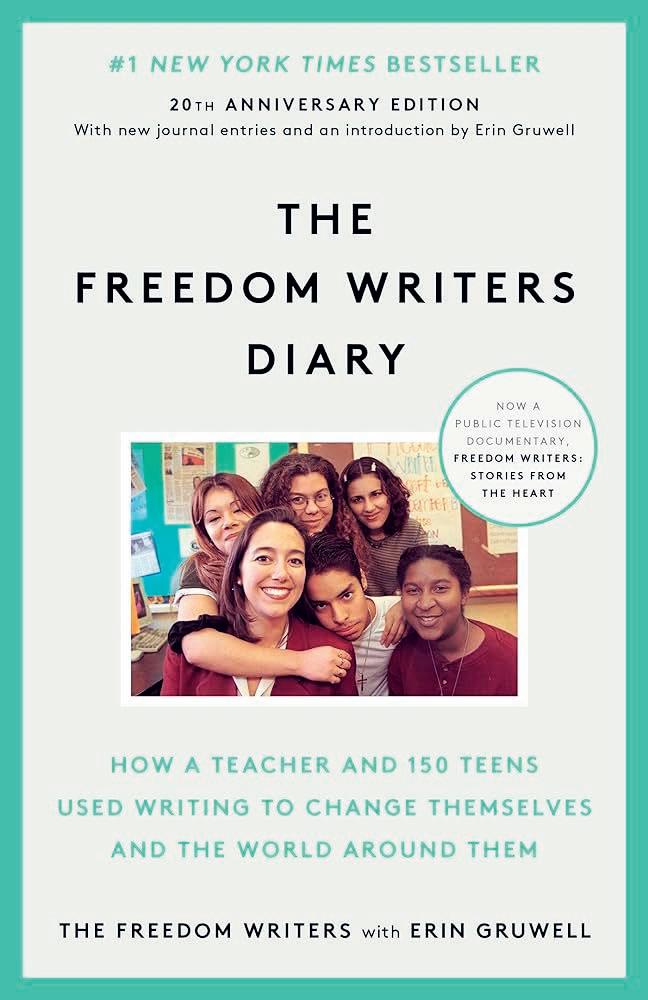
Tomorrow morning, my journey as an English teacher officially begins. Since first impressions are so important, I wonder what my students will think about me. Will they think I’m out of touch or too preppy? Or worse yet, that I’m too young to be taken seriously? Maybe I’ll have them write a journal entry describing what their expectations are of me and the class. Even though I spent last year as a student teacher at Wilson High School, I’m still learning my way around the city. Long Beach is so different than the
gated community I grew up in. Thanks to MTV dubbing Long Beach as the “gangsta-rap capital” with its depiction of guns and graffiti, my friends have a warped perception of the city, or L B C as the rappers refer to it. They think I should wear a bulletproof vest rather than pearls. Where I live in Newport Beach is a utopia compared to some of neighborhoods seen in a Snoop Doggy Dogg video. Still, TV tends to blow things out of proportion.
The school is actually located in a safe neighborhood, just a few miles from the ocean. Its location and reputation make it desirable. So much so that a lot of the students that live in what they call the ”‘hood” take two or three buses just to get to school every day. Students come in from every corner of the city: Rich kids from the shore sit next to poor kids from the projects … there’s every race, religion, and culture within the confines of the quad. But since the Rodney King riots, racial tension has spilled over into the school.
Due to busing and an outbreak in gang activity, Wilson’s traditional white, upper-class demographics have changed radically. African Americans, Latinos, and Asians now make up the majority of the student body.
As a student teacher last year, I was pretty naïve. I wanted to see past color and culture, but I was immediately confronted by it when the first bell rang and a student named Sharaud sauntered in bouncing a basketball. He was a junior, a disciplinary transfer from Wilson’s crosstown rival, and his reputation preceded him. Word was that he had threatened his previous English teacher with a gun (which I later found out was only a plastic water gun, but it had all the makings of a dramatic showdown). In those first few minutes, he made it brutally clear that he hated Wilson, he hated English, and he hated me. His sole purpose was to make his “preppy” student teacher cry. Little did he know that within a month, he’d be the one crying.
Sharaud became the butt of a bad joke. A classmate got tired of Sharaud’s antics and drew a racial caricature of him with huge, exaggerated lips. As the drawing made its way around the class, the other students laughed hysterically. When Sharaud saw it, he looked as if he was going to cry. For the first time, his tough façade began to crack.
When I got a hold of the picture, I went ballistic. “This is the type of propaganda that the Nazis used during the Holocaust,” I yelled. When a student timidly asked me, “What’s the Holocaust?” I was shocked.
I asked, “How many of you have heard of the Holocaust?” Not a single person raised his hand. Then I asked, “How many of you have been shot at?” Nearly every hand went up.
I immediately decided to throw out my meticulously planned lessons and make tolerance the core of my curriculum.
From that moment on, I would try to bring history to life by using new books, inviting guest speakers, and going on field trips. ■
Questions and exercises on the text are on page 159.
Before you listen to the text, look through the word list on page 332.
In 1997 Erin and a group of her students went to Washington, D. C. to meet with Richard Riley, the Secretary of Education (the government minister responsible for education in the US government). One of the students had written some diary entries about what it was like to meet Secretary Riley.
You may like to read through the exercise on page 162 before you listen to the text in the digital material.





Welcome to the Resource Section of Solid Gold 1. Use it to improve the way you learn and use English. It will help you build your vocabulary and sharpen up your grammar, as well as suggesting strategies to get better at understanding, speaking, reading and writing in English. There’s no need to read the whole Resource Section from start to finish—just go straight to the section you need as you work through the book.
Assessing your language ability helps you to keep a record of your progress. Fill out this form when you begin your course, again halfway through the course, and finally at the end to see how you have improved.
The statements match my level of English (choose 0–4) 0 = not at all 1 = a little 2 = fairly well 3 = very well 4 = perfectly
I can understand spoken English both generally and in detail.
I can take part in discussions and comment on both the general content and details in a text or discussion.
I can read and understand different genres in English.
I can change the way I speak and write English depending on what I want to say, who I am talking to or writing for, and the context.
I can express myself orally and in writing, in a clear, coherent and structured way using the appropriate genre, or text type, for the purpose.
I can discuss and comment on the content of written material. I know ways to improve my own writing.
I can select and use different strategies to improve my interaction in English.
I can choose material from different media and use it in my own written work as well as in oral interaction.
I can separate my own thoughts from those of an external source.
I can check and critically evaluate spoken and written sources.
I can discuss cultural differences and make references to my own knowledge, experience and values.
Preparation: pen and paper
When reading, be prepared to make notes on paper or on your computer, mobile phone or other device. You may like to underline or highlight important information directly in the book. Make yourself comfortable and see that you’re not disturbed, if possible.
Pre-reading: What’s the purpose of your reading?
What are you expected to find out when reading? Are you looking for details or is your task to summarize a story or an argument? It’s important to know why you’re reading this particular text and what you are looking for before you start.
Look for clues: headings, subheadings, pictures
Look first at headings, subheadings and illustrations. What conclusions can you draw from looking at these? What do they tell you?
Prior knowledge of the subject
Ask yourself ‘What do I already know about this subject?’
Read the text twice
Your first reading is to get a main overview of the text—a general idea of what the text is about. During your second reading, pay closer attention to the text and try to get a clearer idea of what the writer wants to say. However, if your aim is just to scan the text for specific information, one reading might be enough. You’ll know when you’ve found what you were looking for.
Take notes
Take notes when you’re reading. Write down key words and important information, and use a dictionary if necessary. Remember, key words are the most relevant ones for the content.
What to do if you get stuck
If you get stuck and don’t understand something, move on and then go back later to try to work out why this particular part was so tricky. An overview of the whole text can often help you understand parts.
Divide up the job of reading
If you have to read a long text, plan to read a certain number of pages a day. Write a short summary of each part that you’ve read.
Look at a text in three ways
First of all, consider the basic information on the page. Make sure you understand the words and phrases. Next, try to read ‘between the lines’. That means that you should try to find out what the author really means or wants to say.
Finally, go beyond the text. What does the text make you think about? How can you use your own knowledge, experience or previous reading to relate to it?
What if you don’t understand?
If you don’t understand what a text or part of a text means, ask a friend to help you.

It has always been important to read critically. You should not believe everything that is published, whether that be online or in print. However, now that artificial intelligence services, like ChatGPT, are widely available, it is worth being even more careful. Start by using your “gut feeling” when reading or listening to information and ask yourself could this be true? Does it sound likely? Or not?
Here are some questions to consider when reading or listening to a text.
Who is the author?
Is it a well-known person, or someone who is an expert in the field? Do they have a title, or are they connected to a respected company or university or group? Is a presentation of this author to be found anywhere? Do they represent a particular standpoint or opinion? Can you work out who will gain (money, power etc) if readers believe what the author has written?
Is it possible to contact the author of the text? Are there phone numbers or email addresses provided?
Watch out for fake web addresses. They often try to resemble established addresses to deceive you. Instead of the real Facebook.com, scammers might write Facebook.mail.com. People recognize the word ‘Facebook’, and trust it, without realising that the information doesn’t come from that company.
What is the purpose of the text?
To inform, influence, sell something, entertain, or criticize? You can check the site’s About page where the purpose is usually stated.
When was the text written?
How current is it? An old text might not be relevant any longer.
What facts and opinions are being presented?
Compare the text with another source. Do the facts match? Is it clear whether the author is presenting facts or opinions? If both, make sure that you can tell the difference.
Look at the language and the pictures
Is the language mostly neutral, or do the words seem to be biased? Does the text seem like it might have been automatically translated (for example, with Google Translate)? These could be warning signs. Many fake news statements are written using vague language. That makes it more difficult to assess if they are true or not.
Do the pictures look like they are showing a one-sided story? Or an inaccurate story? A reverse image search, using an online service, can show where an image originally came from or if it appears in a very different context.
Finally, consider if you really feel that you can trust the source.
When you’re writing or preparing a speech you can make use of the rhetorical process. This is a strategy that helps you to plan your writing, and helps you work in a more structured and methodical way. It will also help you to understand the aim or purpose of the text, who you should address your writing to and the context, i.e. when, where and how the text is to be used.
1 Understand the aim and the context
Before writing a text or putting together a speech, start by asking yourself: What’s my aim? What do I want to achieve? What does the context demand?
If you tackle the following questions first, it’ll be easier to write your paper, letter, news item or speech:
What is the purpose? Do you want to write a story, a review, some instructions, or what?
Who are you writing for, or speaking to (the recipient)? Friends of yours? Complete strangers? A potential employer?
Where will your text be published? On Facebook? In a letter of application? As a paper, or as a presentation?
How can you best get your message across? What is required for the genre, or text type, that you have chosen—formal or informal language? Step-by-step instructions, or a casual email?
Why are you choosing this way of getting the message across? Is there another way, which might be better?
2 Find, collect and evaluate material
Find and collect ideas from books, the internet, magazines, newspapers, radio/ TV, etc. Go through the material and make a note of the sources. What can you use? Pick out what you need. Structure your material, i.e. see how different items can go together and decide what order to put things in.
Make a plan before you start to write an article or a speech. It will make your assignment much easier. Think of your work as having three parts:
Introduction Here your aim is to catch the reader’s or listener’s attention. Ask a question, make a statement or give a brief presentation of the subject. For example, if you’re going to write about the importance of recycling you can start by explaining why it’s important.
Thesis This is where the main part of the subject is presented.
Conclusion End by explaining your conclusions or by summing up the text.
Go through what you’ve written. Have you made the right choices of formal or informal language? Did you use words and phrases that suit your purpose? When you’ve checked your work it’s always a good idea to ask someone else to read through what you’ve written and to offer feedback.
When you’ve finished working on your text, check it over one last time—to see if there’s anything you should or would like to change. Use the following as a guide.
1 Read the text out loud to yourself. Does it make sense or is there anything missing?
2 Have you divided the text into separate paragraphs?
3 Is there an introduction, a thesis (the main body of the text) and a conclusion?
4 Does the title, or heading, match the text?
5 Do the structure and choice of vocabulary match the genre?
6 Does your text require formal or informal language? It is better to not to mix the two.
7 Check the use of linking words. For example: To begin with …, In addition …, In conclusion …
8 Check the use of verbs. For example, the -s form, the use of tenses.
9 Check punctuation and capital letters.
10 Check spelling.
11 Check overall grammar. For example, are the articles, prepositions and pronouns correct? Are any adverbs in the right place?
Your peers are those around you who are involved in the same activities as you, in this case your classmates. When you’re in the process of writing a text or when you’ve finished it, it’s useful to let someone else read what you’ve written. What you actually mean can sometimes be difficult for a reader to understand. Therefore, get a classmate or a friend to read your texts and use the questions below as a basis for discussion. At first you might feel uncomfortable about hearing another person’s opinion on what you’ve written, but you’ll get used to it and your writing will gain by it. And don’t forget that the roles may later be reversed and that you’ll be the person giving feedback on what someone else has written.
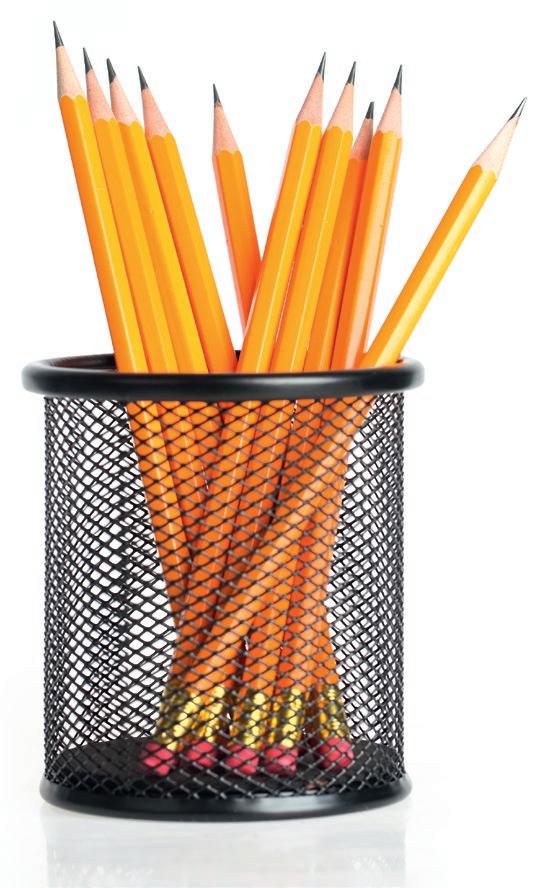
Before you ask for peer response it’s important that you check your own text and that you analyze it in order to make it better.
1 What is the purpose of the text?
2 Does the message come across? How can you summarize the message?
3 Does the headline correspond to the text?
4 What genre is this? Is it well chosen?
5 How is the text structured? Does the introduction link with the conclusion?
6 What kind of linking words are used?
7 Does the choice of vocabulary and grammar correspond to the genre?
8 Is there a good variation of words?
9 Are the sentences grammatically correct?
10 What about paragraphing, spelling, punctuation?
11 Does anything need to be changed?
12 How can the text be improved? Make a few suggestions.
When you speak or write you should adapt your communication depending on who you are addressing, what the topic is, and the situation you are in. These different ways of speaking or writing are known as different genres or text types.
Purpose
Every genre has a specific purpose. The purpose determines how the genre is constructed. For example, instructions are meant to explain a process and are constructed so that the information is given step by step.
Structure
Every genre has its own structure. A set of instructions starts by stating the goal—for example, how to make a delicious fudge cake. This is then followed by a list of ingredients and step-by-step instructions showing how to make the cake.
A news program can also be considered as a genre and has its own structure, often starting with the day’s headlines, followed by details of the major news items, moving on to smaller news items and ending with the weather report. You would probably be surprised if it started with the weather report and ended with major international news.
Language
Every genre has a specific use of language. For example, many newspaper articles are written in the past tense, while a set of instructions will require action verbs in the imperative form.
Think about the different texts you know. You will find that the structure and language of a bedtime story is completely different from that of a car manual explaining how to change a tyre. When writing in a particular genre you need to know how to structure the text and what type of language is required.
To help you, there are model texts for:
How to write a narrative 136
How to write a summary, or a commentary on a story 137
How to write a review 138
How to write a discussion essay 140
How to write an argumentative essay 142
Advice on project work 144
In the digital material you will find:
How to write instructions
How to write a formal letter
How to write an informal letter/email
How to write a formal email
When you write a story there are certain components that are usually included. The scene is set, something happens, a problem arises and finally the problem is solved. Let’s look at an example.
Heading. This should be catchy enough to grab the reader’s attention immediately, and make them want to read the story.
In the first sentence, introduce the action of the story. Someone is stealing something. The setting (where and when) and main character are is also introduced. The problem is presented. There is no one to help.
In the middle of the narrative, write what happened next.
At the end of the narrative, the problem is resolved. The police arrive and arrest the burglars.
Going to bed the other night I noticed people in my shed stealing things.
I phoned the police but was told no one was in the area to help. They said they would send someone over as soon as possible
I hung up. A minute later I rang again. “Hello,” I said. “I called you a minute ago because there were people in my shed. You don’t have to hurry now, because I’ve shot them.”
Within minutes there were half a dozen police cars in the area, plus helicopters and an armed response unit. They caught the burglars red-handed.
One of the officers said: “I thought you said you’d shot them.” I replied “I thought you said there was no one in the area to help.”
• The purpose of a narrative is to entertain and, in some cases, to teach.
• At first you’re given information about who, when where (the background).
• Then the action—a series of events take place.
• A problem is introduced.
• The problem is solved.
• Words indicating time are usually part of a story: then, five minutes ago, a long time ago …
• The story is usually written in the past tense: It happened a long time ago, when I was a child, the other night, etc.
• Dialogue can be used to help bring the characters and the action to life.
A summary gives a short version of a story. You only include the most important information — not your own opinions. Start with the title and background. Then explain the main problem and how it is solved.
Title and background
The main problem
The problem is solved
Round Like a Shot is about a man who sees that someone is trying to break into his garden shed. He calls the police, but they say they cannot come because no officers are nearby. Later, he calls the police again and says he has solved the problem himself — by shooting the burglars. This time, the police arrive quickly and arrest the men.
• A good summary is short and clear.
• Use your own words.
• Focus on the key events: in a story this is the beginning, the problem, and how it ends.
A commentary is where you share your thoughts about a story. You can explain what message you think the story has, how it made you feel, or what you think about the characters’ actions. If the story is longer, it helps to give short quotes and write your reflections about them.
Start with the main message. Add a character judgment. Add an emotional reflection.
Add a personal thought or question
I think the main message of the story is that people sometimes feel they need to take action themselves when they don’t get help. The man in the story was smart to call the police again, but it’s also a bit sad that he had to lie to get their attention. It makes me wonder how we expect people to behave when they don’t feel protected.
• A commentary shares your opinions and thoughts about the story
• Don’t retell the plot, but share what you think the story means and how it makes you feel.
When you write a review of a book or a film, you should include both information about it and your own opinions. A good review helps other people decide whether they want to read or watch it. Some things to include are:
• A short summary of the plot
• A description of the main characters
• The main conflict or conflicts
• A discussion of the theme or message, if there is one Here’s an example of what a book review might look like:
Title or heading. Decide what the main focus will be, and aim for a catchy heading to draw your reader’s interest.
In this part, describe the plot, the main character(s), and setting, and introduce the main conflict. Introduce the theme or question you want to discuss.
Use quotes to back up your ideas.
Slam is the title of a book by the English author Nick Hornsby. Slam could also be a description of skater Sam’s future life.
The book is about a 16-year-old boy called Sam who lives with his mother in London. The story starts when Sam meets Alicia and they fall in love with each other, but what Sam doesn’t know is that his life is about to change forever. Everything goes well for them until Sam loses his feelings for Alicia and dumps her. Then he finds out that Alicia is pregnant with his child.
Sam’s world suddenly tums upside down and he decides to escape from everything to another city. He initially chooses to run away from the problem and to pretend that it isn’t happening. But he only stays away for a couple of days until he realizes that he must face up to the consequences of his actions, even though he is not very happy about the baby.
“If you’re asking me to give my life marks out of ten, I’m afraid I couldn’t go any higher than three. This isn’t what I had in mind. How could it be?” (p.336).
Mention how the character(s) or events develop. But don’t spoil the ending for the reader.
Sam doesn’t value his life very much, only giving it three marks out of ten. On the surface Sam is a normal kid. He does OK in school and he hasn’t got any real ambitions in life except to become a famous skater. But there is a change when the baby comes. He looks after his child, he meets a new girlfriend and he attends college.
Mention any lessons in the novel/film, if it is of interest.
In the conclusion, link back to the theme(s) you introduced.
What is interesting also is Sam’s way of thinking about life. He says when someone in his family makes a mistake another person will correct it in the future. For example, his mother and he both became parents at 16 but he hopes that Roof (his child) won’t become a parent when he’s 16.
The slam helps Sam mature, but it is hard to tell if he is happy. This story will be interesting for teenagers because it could happen to anyone. Also, the story is told using easy to understand language.
There are many funny parts in this book, but although I can’t help laughing, I stop again almost immediately as I realize the sadness of the situation. Sam is in a real slam and he will never really be able to escape from it.
• The purpose of a review is to tell others what you think of a novel or a film (or something similar).
• Include the author and the title of the book or film and the director.
• Summarise the plot briefly.
• Mention the setting (when and where the book/film take place)
• Describe and analyse the main characters.
• Comment on the style of the language.
• Discuss and say what you think about the theme of the book or the film.


UNIT 4 MOVING ON SOME NAMES WORTH KNOWING
UNIT 5 THE UNEXPECTED
UNIT 6 CITY
Let’s talk!
Textwork
Vocabulary: Definitions
Interact
Personal profile
Writing: A letter to your new English teacher
WSM (NINE REASONS WHY …)
Check your English FOCUS ON GRAMMAR
LISTENING: LOSING MY VIRGINITY
Starter
Listen and recall
Vocabulary: Right or wrong?
Interact
Speaking
Ways to describe people
THE FREEDOM WRITERS DIARY
Starter
Textwork
Interact
Looking at phrasal verbs 1
Vocabulary Bank: Useful verbs 1
LISTENING: THE FREEDOM WRITERS DIARY CONT’D
Listen and recall
Interact
Vocabulary: Which word … ?
Fun with vocabulary 1
Sum up and comment
Books to read and enjoy
001 Let’s talk!
Things we have in common
Work in groups of 3–4. How much do you have in common? Here’s your chance to find out. Read and discuss the following and write down your answers.
Try to find:
1 a country or city you’d all like to visit one day.
2 something you’re all afraid of.
3 some kind of exercise you all do at least twice a week.
4 a pet hate you all share.
5 a dish that’s a favourite with everyone.
6 the worst film you’ve all seen.
7 a person you all admire and respect.
8 something very expensive you’d all like to have.
002 Textwork
Show that you have understood the text The Right Level? by completing the statements below with information from the text. Sometimes one or two words are enough.
1 The writer will be studying Italian for hours a week.
2 She had got ready for her first day at the school the previous night by
3 Everyone on their first day has to take a test to make sure they are placed .
4 The writer thinks being put in a Level One class would be
5 The test has both a written and an part. She ends up in a class.
6 She realized quite quickly that the level she had chosen .
7 Compared to her, the rest of the people in the class seemed in Italian.
8 Once the break comes she decides to .
Practise the vocabulary in Wordmatch/Spelling
Here are definitions of eight words from the text. Can you work out what they are? To help you, the first and last letter of each missing word is given.
1 If an experience is then it makes you feel ashamed or stupid and you may even lose the respect of others.
2 To learn something so that you’ll remember it exactly. m
3 One of the periods into which a year is divided at a college or university, especially in the USA.
4 Another word for ‘choose’. s t
5 A person who’s the same age as you or who has the same type of job, social status, etc. p r
6 Having a pleasantly soft rounded body or shape. It’s a polite way of saying ‘slightly fat’. p p
7 When a person is in a language, they can speak it really well.
8 To run with quick, short steps. s y
1 What do you think is a) the easiest thing b) the most difficult thing about learning English?
2 Which of the four language skills do you find most difficult in English: listening, speaking, reading or writing?
1 How old are you? How might your age affect both what you know and your attitude toward gaining knowledge?
2 What’s your mother tongue? What other languages do you speak? How might your particular languages affect your knowledge e.g. about traditions, food, music?
3 What is your previous experience of learning English? What strategies have you used when learning a language?
4 Here are 25 adjectives to describe someone’s personality. Working alone, write down five of the adjectives that best describe you.
affectionate, ambitious, cautious, cheerful, confident, determined, easy-going, efficient, forgetful, funny, hard-working, imaginative, impatient, impulsive, modest, outspoken, patient, punctual, reliable, sensible, sensitive, shy, stubborn, superstitious, talkative
Now find a partner. Compare and discuss what you have written. Are there any other words you might have used that aren't on the list?
Write a letter to your teacher and introduce yourself. You can write about your interests, what your hopes are for your upper secondary school years, dreams about your future career, and a few words on how you feel about English. For example, what challenges you have when learning the language, what books you have read etc.
Before writing, read through How to become a better writer on page 132 in the Resource Section.
Nine reasons why the English language is so hard to learn!
1 As she gave a slight bow of her head as a greeting, I noticed that she had a pink bow in her hair.
2 I think it’s time to polish up my Polish before I go to Warsaw.
3 The French soldier decided to desert in the middle of the desert
4 Although the object was very ugly, no one seemed to object to it.
5 They couldn’t close the door because the bed was too close to it.
6 Amelia shed a tear after seeing a large tear in her favourite dress.
7 The committee have agreed to present their report to those present after lunch.
8 I’d love to record a record. The trouble is, I can’t sing!
9 There was a row among the Oxford boat race team about how fast to row
Try saying the above sentences aloud. How would you translate the words in bold type?
The writer had to take a test to see how much Italian she already knew. This is a chance to see how much English you already know—especially English vocabulary. Work in groups of 3–4. Your teacher will give you more information.
Plural Nouns
Countable/Uncountable Nouns
The Genitive
The Indefinite Article
312
312 p. 313
The Definite Article p. 310 p. 311
008 Starter
You can find more explanations and many grammar exercises in Online Grammar in your digital bookshelf.
Work in small groups. What do you remember about your early schooldays?
Think about:
The school you went to A happy memory
The teachers A school tradition
Your friends A school outing
009 Listen and recall
A Listen to the extract from Richard Branson’s autobiography Losing My Virginity and answer the following questions.
1 What two problems did Richard Branson have when he first went to school?
2 How were people with dyslexia regarded in those days?
3 What often happened to him at prep school?
4 What was he good at? Name one thing that helped him because of that?
5 What happened in 1961 when he competed in the long jump?
6 What happened to him during a game of football?
7 What happened while they were operating on him in the hospital?
8 What was he good at? Name one thing that helped him (because of that).
B Now read through the sentences and then listen again and say which of the following sentences are true (T) or false (F). (They’re in no special order.)
a Sport is very important in British public schools.
b Richard Branson has now managed to overcome his dyslexia.
c Douglas Bader is someone who had lost both his legs.
d At school, Richard Branson was captain of the hockey team.
e His best friend at school was Victor Ludorum.
f Virgin originally sold records via mail order.
g Losing My Virginity was written by a journalist.
h At school, Richard Branson was very good at running.
i His mother felt sorry for him when he was recovering at home.
Practise the vocabulary in Wordmatch/Spelling.
Work in pairs. Check that you have understood some of the words used in the text Losing My Virginity by stating whether they are used correctly in the following sentences. Mark each sentence R (right) or W (wrong). If wrong, explain why and write a new sentence to show how the words should be used.
1 Our survey shows that one in four children is bullied at school.
2 Andrew Morton once wrote an autobiography of Princess Diana.
3 I have to hold the newspaper at arms length when I read, as I’m terribly short-sighted
4 His grandfather founded the company in 1882.
5 She fell off her horse and tore a cartilage in her back.
6 My grandmother has photographs of all her grandchildren on the mantelpiece.
7 The boat soared through the water.
8 It took her over six months to recover from her operation.
9 A woman was found at the side of the road by a cyclist. She was unconscious and could only speak very quietly.
10 Students learning English often confuse ‘your’ and ‘you’re’.
11 He’s a keen sportsman and enjoys playing tennis, cricket and rugby.
12 They hired a large wooden marquee for the wedding party.
1 Richard Branson was bullied at school. How does your school deal with bullying? Come up with a 5-step programme to stop bullying in schools.
2 What do you know about cyber bullying—especially on social network sites? What do you think should be done about it?
A The text that you listened to about Branson is a narrative text. Work with a partner and take turns at retelling parts of the text. Use keywords when retelling the story. Here are some suggested keywords.
Branson - chairman - autobiography - trouble - dyslexic - stupid or lazy - good at sports - school hero - captain - long jump - hurt his knee - hospital - mother’s advice
B Richard Branson is a famous entrepreneur. Here are some others. Choose one and present a short biography of that person. Work in groups of four.
Jeff Bezos
Warren Buffett
Arianna Huffington
Howard Hughes
Kylie Jenner
Kivan Mazumdar-Shaw
Pierre Omidyar
Larry Page
Taylor Swift
Vera Wang
Oprah Winfrey
Mark Zuckerberg
A Use the words below to complete the sentences. It may be helpful to use a dictionary. absent-minded brainy down-at-heel full of beans henpecked highly strung hot-headed laid back light-fingered long in the tooth pig-headed stuck up thick-skinned tight-fisted two-faced well-off
1 If you describe someone as , you mean that they’re old.
2 Someone who’s is very relaxed and doesn’t seem to be worried about anything.
3 A person is mean and doesn’t like spending money.
4 A person is very intelligent and is especially good at studying.
5 Someone who’s is insensitive to criticism and isn’t easily offended.
6 An person tends to forget things because they’re often thinking about something else.
7 If a man is described as , this means that he is always being told what to do by his wife or partner and is afraid to disagree with her.
8 A person is someone who thinks they’re better or more important than other people.
9 A person is very nervous and is easily upset.
10 If you describe someone as being , you mean that they’ve got a lot of money.
11 A child who is is very lively.
12 If you describe someone as , you mean that they have a habit of stealing things.
13 Someone who’s is determined to do things their way and refuses to change their mind, even when there’s a good reason for doing so. In other words, they’re very stubborn.
14 A person is someone dressed in old, worn-out clothes usually because they don’t have much money.
15 A person is very insincere and might agree with you to your face but will disagree with you behind your back.
16 Someone who’s is very emotional and passionate and tends to do things without thinking first.
B Now discuss the following in small groups.
1 Do you know anyone who’s really tight-fisted? Why do you think some people are like this?
2 Do you think women are more highly strung than men? Or the opposite? Give reasons.
3 How much money would a person in Sweden have to earn to be considered well off?
4 Think of some jobs where it might be useful (or even necessary) to be a bit thick-skinned
5 Not only people but places can sometimes be down at heel. Can you think of any places you’ve visited that are beginning to look a bit down at heel?
6 Which would you prefer to be—popular or brainy? Give reasons.
13)
014 Starter
1 What famous diaries do you know of?
2 What do people usually write about in their diaries?
3 What forums do people use today to write about or present themselves?
Before reading The Freedom Writers Diary, go to Reading strategies on page 121 in the Resource Section. Try some new methods to become a better reader.
Read through the text from The Freedom Writers Diary and answer the questions below by completing the sentences.
1 Name two things that Erin Gruwell is worried about regarding meeting her students.
2 What impression did MTV and Snoop Doggy Dog give about Long Beach? That it was
3 Why do so many people want to go to Wilson High School?
4 What do we learn about the students who go to the school?
5 What do we learn about the majority of the student body?
6 Name two things we learn about Sharaud.
7 What did one of Shaurad’s classmate do that really upset him?
8 What happened when Erin saw the picture?
9 What did she learn about the students’ knowledge of the Holocaust and about how many students had been shot at?
10 In what ways did she decide that she would try to bring history to life?
1 What kind of person do you think Erin is?
2 Why did the picture of Sharaud prompt her to talk about the Holocaust?
3 What do you think about her choice of teaching methods?
4 The Freedom Writers Diary was also made into a film called Freedom Writers. Have you seen it? What did you think about the film?
Practise the vocabulary in Wordmatch/Spelling.
Phrasal verbs with ‘on’ and ‘off’
A. Complete the definitions below with a suitable phrasal verb. Choose from the following and make any verb changes where necessary. bring on catch on count on go on pick on try on break off drop off lay off put off show off tell off
1 If you someone, you rely on them for their help and support.
2 If you a relationship, you end it.
3 If you someone , you distract them in some way or discourage them from doing something.
4 If you a piece of clothing, you put it on to see whether it fits and looks nice.
5 If something an illness or physical discomfort, then it’s the cause of it.
6 If an employer workers, they lose their jobs, often temporarily, because there is no more work for them to do.
7 If you someone , you scold or reprimand them for something they’ve done wrong.
8 If something , it becomes popular or fashionable.
9 To means to fall asleep.
10 If you doing something, you continue doing it.
11 People who try to impress others with their skills or abilities.
12 If you someone, you repeatedly and unfairly treat them badly, often by punishing them or giving them boring or unpleasant jobs to do.
B Now work in pairs or small groups and discuss the following.
1 Why is it wrong to pick on people? What makes some people do that?
2 Which fashions or websites have really caught on in the past year or so?
3 Name three things that would put you off eating a certain dish.
There are a number of verbs, adjectives and nouns that are common both in speech and in writing which can be considered as ’essential’ vocabulary which needs to be a part of your own vocabulary bank. In Sold Gold 1 you’ll get a chance to build on and revise some of the most useful ones. Let’s start with verbs. Put the correct verb in each sentence. Make any necessary changes. Choose from:
admit bribe pretend punish waste
1 In many countries, it’s illegal to government officials or police officers. (muta)
2 Don’t your money doing the National Lottery. You haven’t got a hope of winning! (slösa bort)
3 James wanted to go home early, so he to be ill. (låtsas)
4 ‘All right! I it! I broke the vase!’ Tom said to his mother. ‘But it was an accident!’ (erkänna)
5 Do you think we should criminals or try to cure them? (straffa)
Now turn to page 300 in Vocabulary Bank and do Useful verbs 1.
15)
019 Listen and recall
Part 1
Listen to the diary entry from The Freedom Writers Diary and then answer the questions below by completing the sentences.
1 Erin Gruwell and her students are in Washington, D.C. to meet Richard Riley who is the .
2 Before meeting him, they went on a tour of the Capital and enjoyed visiting several
3 The writer is one of Erin’s students. Before she meets Richard Riley for dinner she wonders two things about him, namely
4 The student is not alone. She has with her.
5 The reason that Erin and her students are going to meet Richard Riley is to give him .
6 Richard Riley said something to Erin and her students which made them happy. He said ,
7 The student had imagined that Richard Riley would be stuck up but instead she thought he was .
8 He also told them about himself and that he had had to overcome many to be what he is today.
9 The students found it hard to believe that they were in front of the most important man in and that he seemed to be by what they had accomplished.
10 Her conclusion after the evening was that you could become anything with .
11 The student thought the evening had been a very good experience, but she was also thrilled at being given
12 As far as the student was concerned, the evening would forever.
Now listen to the poem that Erin’s student read out at the dinner and then fill in the gaps in the sentences below with the correct words.
1 The student uses the phrase ‘Stay Proud’ when she talks about colours, namely
2 What do you think she means when she says ‘you’ll never be anything else but you’?
3 She mentions types of jobs. No matter what jobs you do, she says and still be the best you can be.
4 She uses the word ‘proud’ together with four verbs, namely
5 She uses the word ‘Don’t’. She says ‘Don’t lay down’. Name three other ‘Don’t’ items she mentions, namely
6 What does it mean when people criticize you? It means that
7 At the end of the poem she mentions ‘the stiff’. What does she mean by that?
1 What do you think is the real meaning of the poem?
2 Were you able to relate to the emotions and experiences in the poem? Why or why not? Give reasons for your answer.
Practise the vocabulary in Wordmatch/Spelling.
Here are some words found in the listening The Freedom Writers Diary.
a standing ovation dignity panhandler righteous accomplish diverse pursue stuck up be moved grownups rehearsal sell out big shot
Fill in the gaps below with a word from the box. Each word is only used once. Which of the above …
1 means to be touched emotionally?
2 is a person who stands in the street and asks for food and money?
3 is morally right or justifiable?
4 describes people clapping after a performance or speech?
5 is practice for a performance or a play?
6 is showing a great deal of variety?
7 is an important or influential person?
8 describes a person who is arrogant and conceited?
9 means to achieve something?
10 is another word for following or chasing someone or something?
11 means to have a sense of your own importance and value?
12 means to betray your principles?
13 means the same as the word adults?
Work in pairs. Replace the words in bold type in the following sentences with a single word. To help you, the first letter of the missing word is given.
1 My sister is a person who performs operations at a hospital. s
2 She was a happy person who was always expecting the best to happen o
3 James said he was sorry for arriving late. a
4 We’ve just booked a holiday on a large ship this summer—to the Mediterranean. c
5 Most of the people who worked on the ship were from Pakistan. c
6 This is my brother’s son, Jack. n
7 Years after the accident, Julia still had frightening dreams about it. n
8 The dead body of a person was found by a man walking his dog in the woods. c
9 I’ve only seen my ex-wife once since the legal ending of our marriage. d
10 There was a large sign near the entrance saying ‘people who steal from shops will be prosecuted’. s
11 At the end of the war, Mata Hari was hanged as a person who betrayed her country. t
12 Be careful with that vase. It’s easily broken or damaged! f
13 As I read my mother’s letter, I began to feel more and more unhappy because of being away from home and missing my family and friends. h
14 My sister’s going to have a baby, so she’s stopped smoking and drinking. p
15 Jake has been out of work for over 6 months. u
16 Many people believe that a Third World War is bound to happen i
1 Have you learned any new strategies for learning English? What new strategies will you use?
2 What did you learn from reading and listening to the texts from Freedom Writers Diary?
3 What are your goals for your English studies?
4 What should you think about when choosing a website to trust?
Branson, Richard: Losing My Virginity The Autobiography
Dahl, Roald: Matilda*
Honeyman, Gail: Eleanor Oliphant is Completely Fine
Gilbert, Elizabeth: Eat Pray Love
Gruwell, Erin: Freedom Writers Diary
Hustvedt, Siri: The Summer Without Men
Kamkwamba, William and Bryan Mealer: The Boy Who Harnessed the Wind
Kleinbaum, N.H: Dead Poets Society*
Rhue, Morton: The Wave*
Schwarzenegger, Katherine: Rock What You’ve Got
Westover, Tara: Educated
* teenage fiction or less advanced books.
In, at, and on
Use in with enclosed spaces (e.g. rooms, buildings) and also with towns, parks, countries, continents and containers.
My sister’s in the bathroom washing her hair. ‘Where’s Tom?’ ‘He’s still in bed.’
Use on with surfaces (e.g. walls, shelves, floors) and lines (e.g. paths, coasts, the equator).
Please don’t walk on the grass. He has a flat on the fourth floor.
Use at with a place or a building. We waited for ages at the bus stop. Jill and Ken spent the evening at home.
In, at, and on
Use in with parts of the day (morning, evening, etc.) and with months, seasons, years and centuries. in the morning, in January, in the spring, in 1944, in the 19th century, in the 21st century, etc.
Use on with days and dates. on Monday, on Christmas Day, on December 10th (Say ‘on December the tenth’ or ‘on the tenth of December’).
Use at for times of the day and with meals and mealtimes. at 11.30, at three o’clock, at breakfast and with these words: at night, at midnight, at the weekend, at Easter, at Christmas, at Midsummer, at the moment, at the end of the week/month/year
THE RIGHT LEVEL?
level nivå attend gå på political science statskunskap short story novell memoir självbiografi, memoar depict skildra divorce skilsmässa publish publicera, ge ut explore utforska ambivalent kluven, vacklande, obestämd marriage äktenskap get settled komma till rätta, få ordning shameless oblyg, fräck grade årskurs patent leather lack(skinn) ability förmåga humiliating förnedrande, förödmjukande entire hel semester termin memorize lära sig utantill hammer down h. spöregna, hamra ner geek tönt oral muntlig in my opinion enligt min åsikt select välja (ut) endive endiv (en slags sallad) saunter strosa, flanera smugly självbelåtet peer jämlike swiftly snabbt evident tydlig, uppenbar barely nätt och jämt rapid-fire kulsprutesnabb apparently uppenbarligen fluent flytande gasping for air kippa efter luft, inte få luft wobbling osäkra, darriga scurry rusa, kila plump mullig, rund
LOSING MY VIRGINITY
virginity oskuld chairman ordförande educate utbilda; gå i skola found grunda mail order postorder retailer återförsäljare autobiography självbiografi short-sighted närsynt
deem anse accurately exakt prep(aratory) school (privat) förberedande skola confuse blanda ihop intuitive intuitiv, ung. att gå på känsla proposal förslag dwell dröja vid, älta, fundera (länge) grasp fatta tag i; begripa expand utveckla, vidga saving grace min räddning overestimate överskatta public school privatskola för 13–18 år bully mobba master lärare fail bli underkänd intensely ytterst keen angelägen excel vara bäst, utmärka sig cup pokal sprinting sprinterlopp hurdling häcklöpning long jump längdhopp soar sväva marquee stort tält Victor Ludorum mästartitel defender försvarare score a goal göra mål boot sparka bounce studsa floor somebody slå omkull någon sliding tackle glidtackling ghastly hemsk, fasanfull a split second en bråkdel av en sekund, mycket snabbt twisted vriden angle vinkel matron husmor agony svåra plågor, smärta cartilage brosk general anaesthetic narkos unconscious medvetslös evacuate evakuera, utrymma recover återhämta sig mantelpiece spiselhylla
THE FREEDOM WRITERS DIARY diary dagbok at-risk students riskelever undertake företa, sätta igång med embark on inleda odyssey resa
Författarna till Solid Gold, Eva Hedencrona, Karin Smed-Gerdin och Peter Watcyn-Jones har skrivit många uppskattade läromedel i engelska för gymnasiet.
Solid Gold 1, för Engelska nivå 1, är ett utmanande läromedel för elever på högskoleförberedande program och för studerande inom vuxenutbildningen eller motsvarande. Den andra upplagan har reviderats och uppdaterats i linje med Gy25.
Materialet innehåller ett brett urval av texter och övningar, en praktisk resursdel i Resource Section, överskådliga grammatiksidor samt ordlistor.
Texterna följer nio teman, och ger prov på många olika texttyper och genrer.
I Resource Section finns en guide för användbara strategier bland annat om hur man blir en bättre talare och skribent, och hur man anpassar sitt språk beroende på situation och mottagare, samt modelltexter.
I det digitala materialet finns läromedlets övningar i digital, självrättande form för träning av alla glosor samt generella språkfärdighetsövningar. Ljudet till hörövningarna med interaktiva innehållsfrågor finns också här. I e-boken finns även alla bokens texter inspelade med autentiska röster och textföljning.
Var och en kan söka på innehåll i boken och lägga in anteckningar och eget material, exempelvis i form av webblänkar. Tillgång till Online Grammar 1 ingår också i det digitala materialet.
Läromedlet kan användas på dator eller surfplatta, och delvis på mobiltelefon.
Licensen som ingår i elevpaketet gäller i tre år och kan ärvas mellan elever.
Solid Gold finns även som digital elevlicens och som digitalt klasspaket.
Andra upplagan